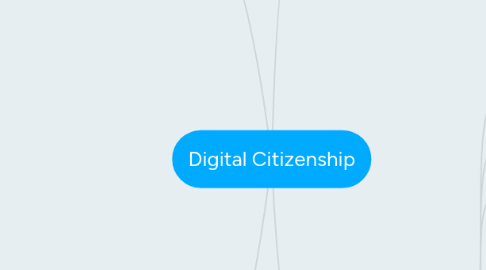
1. Respect Yourself/Respect Others
1.1. Internet Access and Law
1.1.1. Nobody denied digital access
1.1.2. Unethical Actions
1.1.2.1. Stealing Music
1.1.2.2. Stealing intellectual property
1.1.2.3. Plagiarizing
1.1.2.4. Creating destructive viruses/worms
1.1.2.5. Stealing personal information/identity
1.2. Digital Etiquette (Netiquette)
1.2.1. Difficult to monitor by educators
1.2.2. Always use discretion in internet activity, refrain from spamming
1.2.3. Review, proofread, plan communications
1.2.4. Be yourself
1.2.5. Refrain from caps and tell the truth
1.3. Cyberbullying
1.3.1. Measures of prevention
1.3.1.1. Do not send a message when angry
1.3.1.2. Keep devices in open, common use spaces
1.3.1.3. Do not open messages from somebody you don't know
1.3.1.4. Do not give out personal information
2. Protect Yourself/Protect Others
2.1. Health & Wellness
2.1.1. Internet Addiction
2.1.2. Ergonomic practices
2.1.2.1. Carpal Tunnel
2.1.2.2. Frequency/duration of use
2.1.3. Eye safety
2.1.4. Psychological stress
2.2. Digital security
2.2.1. Virus protection
2.2.2. Backups of data
3. Educate Yourself
3.1. Digital Literacy
3.1.1. How to Learn in Digital Society
3.1.2. Safety and security online
3.1.3. Social awareness/online identity
3.1.4. Searching/Processing Skills
3.1.4.1. What is real? What is fake?
3.1.4.2. Information overload: what's important?
3.1.5. Navigation and access skills
3.1.6. Technological rights & responsibilities
3.1.7. Networking
4. Connect With Others
4.1. E-mail
4.2. Cellphones
4.3. Messengers
4.4. Commerce
4.4.1. Exchanging money for tangible goods
4.4.2. Advertising property
4.4.3. Trading goods
4.4.4. Exchanging intellectual property
4.4.5. Illegal exchanges
4.4.5.1. Pornography
4.4.5.2. Illegally downloading/streaming
4.4.5.3. Online gambling

